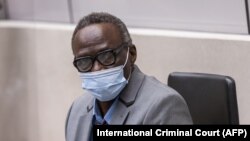The International Criminal Court trial of Ali Muhammad Ali Abd al-Rahman, which began Tuesday, is a long-awaited moment for many former residents of Sudan’s Darfur region now living in South Sudan.
The former Janjaweed militia leader - also known as al-Kusayb – faces 31 counts of war crimes and crimes against humanity for actions allegedly committed in Darfur between August 2003 until March 2004.
The Janjaweed were armed groups that then-Sudanese president Omar al-Bashir deployed to crush a rebellion in Darfur in 2003.
The ICC issued an arrest warrant for Kushayb in 2007. He surrendered in 2020 and has been held at The Hague in the Netherlands ever since.
Ibrahim Yaya Osman, a trader from Darfur working in Juba, said “If this man is confirmed [convicted as] a criminal by the court, then he has to be punished because we need justice. My people were killed in Darfur and we want to know why they were killed,” he told VOA’s South Sudan in Focus.
An estimated 300,000 civilians were killed in Darfur and another 2.7 million were displaced by July 2015. The key perpetrators were the Janjaweed and Sudanese government forces, said the ICC.
Mohamed Hussein, whose family was forced to flee Darfur due to the fighting, told VOA some of his relatives were killed by the Janjaweed.
“My family was forced to become refugees in another country because of the Janjaweed. My relatives were killed, so my family members had to flee from Darfur to Chad. Now they are still refugees in Chad and we have waited for justice since 2003. It’s been nearly 20 years now as a refugee because of Janjaweed, so I have suffered a lot and I need to see justice prevail,” said Hussein.




